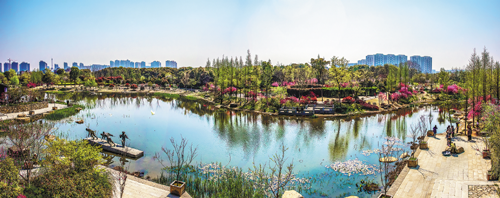The green path to enlightenment

A village in suburban Hangzhou is being held out as an exemplar of progress in promoting responsible waste sorting in the countryside.
In December the village of Gaocheng ranked top in a monthly competition among 24 villages and communities of Dinglan subdistrict, said the village head, Yu Jianguo. Seven months earlier Gaocheng had been a straggler at the other end of the pack.
In June the village launched a system of incentives to help villagers cultivate the habit of good waste handling.
Gaocheng, about 20 kilometers north of downtown Hangzhou, has 204 households and a population of 895.
In front of each of those households now stand two garbage receptacles, a green one for perishables and a gray one for anything else.
Every day after dinner volunteering supervisors check whether the rubbish has been properly sorted, something that makes the job of those who collect the trash early the next day easier.
A random check is also made once a week.
Supervisors rate every household's performance and award a mark, and once a month the total of marks can be converted into grocery purchases such as laundry detergent, toilet paper and cooking oil.
Yu says the village has spent more than 20,000 yuan ($3,100) a month on such awards over the past half year.
At the end of the year, villagers' performance in keeping their environment clean can be taken into account in naming exemplary families, with cash bonuses being awarded.
One of the villagers, Li Rongchun, said that at first there was a wide divergence in the performances but over time villagers' waste handling has improved, and most families perform well enough to be able to win the maximum number of points.
Last month Li's family was awarded masks and napkins, items that can also be used in improving epidemic prevention.
Yu said it is more difficult to promote wise waste handling in rural areas because most villagers have ways of doing things so deeply ingrained that they are hard to change. In addition, the population is widely dispersed, which makes a waste handling program harder to supervise.
The city of Hangzhou started mandatory waste sorting of four categories-recyclables, perishables, hazardous and other wastes-in the urban area in August 2019, and later in villages with the classification reduced to two categories, as is the case in Gaocheng.
Li said he believes that in future villagers will be able to get used to sorting rubbish into four categories.
While the total volume of garbage is difficult to calculate, it is decreasing because villagers have become aware of the wisdom of collecting waste paper boxes and bottles for reuse or sale, Yu said.
The village is located in the Gaoting Mountain scenic region well known for its peach blossoms in spring, so fallen tree branches and leaves complicate villagers' task in keeping things clean and tidy. The village thus spent 50,000 yuan on machinery to pulverize this waste and turn it into fertilizer.
The village administration deals with used batteries and bulky waste.
Yu said his mother, in her 70s, at first considered sorting garbage a waste of time and refused to comply with the regulations, but changed her mind after being a supervisor for a month. She has been able to teach others tips on classification.
When President Xi Jinping, at that time serving as vice-president, visited the village in 2008, the road was covered with mud, alongside were shanties, and fowls wandered anywhere they wanted, Yu said.
But since 2010 village infrastructure including the main road, park and sewage disposal have greatly improved, a result of Hangzhou wanting to develop tourism in its urban area to the north.
In recent years villagers have rebuilt 198 villas of three stories surrounded by osmanthus, camphor, orange, cherry or waxberry trees. They have also demolished walls enclosing their yards to give the community a more open look and feel, at the same time making access for the increasing traffic easier.
Twenty-nine households now run agritainment businesses, the most successful one with income of more than 600,000 yuan a year before the pandemic. Most of the businesses are said to generate 100,000 yuan to 200,000 yuan in income a year, according to Yu.
Villagers have all joined Gaocheng's shareholding economy that runs two cemeteries and revitalizes collectively owned land, real estate and other investment. Each of the villagers received a dividend of more than 35,000 yuan last year.
The rewards system will continue, even though villagers have got the message about the importance of sound domestic waste sorting, Yu says.
In December the provincial people's congress of Zhejiang adopted a regulation on domestic waste sorting, aiming to reduce garbage generation, improve recycling and promote refuse treatment.
The regulation clarifies the responsibilities of government institutions and individuals, and calls for multiple recycling of packaging and daily articles, the provincial government said.
A charging system for garbage treatment in line with the principle "produce more, pay more" will also be introduced.



Today's Top News
- High-speed rail reaches 50,000 km milestone
- Iconic hall reopens after decade-long renovation
- China puts sanctions on US defense firms, execs
- Sanctions show China's resolve to safeguard its sovereignty and territorial integrity
- China OKs three action plans to build pilot zones for a Beautiful China
- CPC leadership meeting stresses steadfast implementation of eight-point decision on improving conduct






























